BOOKS
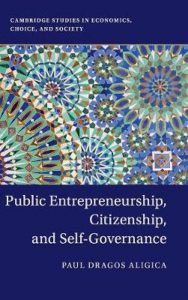 Public Entrepreneurship, Citizenship, and Self-Governance, Cambridge University Press: Cambridge.
Public Entrepreneurship, Citizenship, and Self-Governance, Cambridge University Press: Cambridge.
Responding the new wave of collectivism, paternalism, populism and authoritarianism requires a reinforcement of the theories of self-governance shattered by recent developments in behavioral economics and philosophy which questioned the viability of governance based on citizens’ civic capabilities and public entrepreneurship. Building on the work of the ‘Bloomington School’ created by Nobel Laureate Elinor Ostrom and Public Choice political economy co-founder Vincent Ostrom, Aligica presents a fresh conceptualization of the key processes at the core of democratic-liberal governance systems involving civic competence and public entrepreneurship. The result is not only a re-assessment and re-articulation of the theories constructed by the Bloomington School of Public Choice, but also a new approach to several cutting-edge discussions relevant to governance studies and applied institutional theory, such as the debates generated by the recent waves of populism, paternalism and authoritarianism.
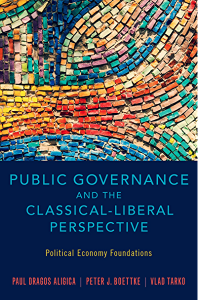 Public Governance and the Classical Liberal Perspective. The Political Economy Foundations. Oxford University Press: Oxford.
Public Governance and the Classical Liberal Perspective. The Political Economy Foundations. Oxford University Press: Oxford.
Classical liberalism entails not only a view about the proper scope of government and its relationship with the market, but also a distinct theory about how government should operate within its proper area. This book presents the basic governance theory and political economy principles underpinning this vision. Building upon the works of diverse authors such as Friedrich Hayek, James Buchanan and Vincent and Elinor Ostrom, the book offers a profound challenge to how public governance is commonly understood, by shifting the focus along several dimensions. The book’s three parts reconstruct the theoretical foundations of the position; then explore its nature and development at the interface between Public Choice and Public Administration; and, finally, illustrate via a set of concrete governance issues, how it operates at the applied level. The book thus fills a large gap in the academic literature, the public discourse as well as in the ways decision makers understand the nature and administration of the public sector.
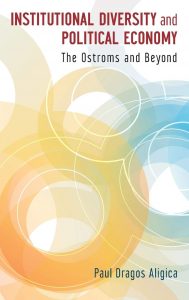 Institutional Diversity and Political Economy. The Ostroms and Beyond, Oxford University Press: Oxford.
Institutional Diversity and Political Economy. The Ostroms and Beyond, Oxford University Press: Oxford.
Elinor Ostrom, co-recipient of the 2009 Nobel Prize in Economics, argued that we should not be limited to the conceptions of order derived from the work of Adam Smith and Thomas Hobbes when studying social order. She maintained that we should not limit ourselves to the theoretical frameworks of “The State” and “The Market.” Instead, we need approaches that match the extensive variety of institutional arrangements existent in the world. In this book, Paul Dragos Aligica discusses some of the most challenging ideas emerging out of the research program on institutional diversity associated with Ostrom and her associates. He outlines a set of new research directions and an original interpretation of the significance and future of this program.
 Capitalist Alternatives: Models, Taxonomies, Scenarios, Routledge: London and New-York.
Capitalist Alternatives: Models, Taxonomies, Scenarios, Routledge: London and New-York.
What are the most effective ways to conceptualize the existing models of capitalism that have captured the public imagination and are currently floating around in the public debate? How can one mobilize empirical analysis and theory in thinking about the realm of possibilities and about the future of economic order, but avoid the twin perils of scientism and historicism? This book is an attempt to respond to these and related challenges. First, it delves into the substantive aspect of the debate, taking a closer look at a set of particular forms and models of capitalism that are currently discussed both in mass media and in academic circles as plausible, or at least possible, alternatives to the status quo: Crony, State, Regulatory, and Entrepreneurial Capitalisms. Second, the book takes a step further, looking at the epistemic, theoretical and methodological dimensions of the discussion: What is involved, more precisely, in our classifying and theorizing of capitalist systems and their historical evolution? What is the epistemic basis for building plausible conjectures about the future evolution of an economic system? What are the logical and methodological parameters of our endeavors that deal with economic systems, or with the problem of continuity and change in comparative economic systems? Offering an original approach to the problem of alternative forms of capitalism, this book will be of great interest to scholars working in the field of comparative political economy.
 Rethinking Institutional Analysis and Development: The Bloomington School, Routledge, London.
Rethinking Institutional Analysis and Development: The Bloomington School, Routledge, London.
The Bloomington School has become one of the most dynamic, well recognized and productive centers of the New Institutional Theory movement. Its ascendancy is considered to be the result of a unique and extremely successful combination of interdisciplinary theoretical approaches and hard-nosed empiricism. This book demonstrates that the well-known interdisciplinary and empirical agenda of the Bloomington Research Program is the result of a less-known but very bold proposition: an attempt to revitalize and extend into the new millennium a traditional mode of analysis illustrated by authors like Locke, Montesquieu, Hume, Adam Smith, Hamilton, Madison and Tocqueville. As such, the School tries to synthesize the traditional perspectives with the contemporary developments in social sciences and thus to re-ignite the old approach in the new intellectual and political context of the twentieth century. The book presents an outline and a systematic analysis of the vision behind the Bloomington Research Program in Institutional Analysis and Development, explaining its basic assumptions and its main themes as well as the foundational philosophy that frames its research questions and theoretical and methodological approaches.
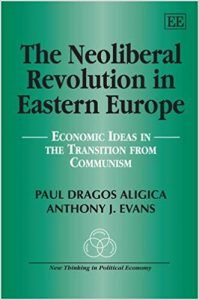 The Neoliberal Revolution in Eastern Europe: Economic Ideas in the Transition from Communism, with Anthony Evans, Edward Elgar Publishing, Cheltenham.
The Neoliberal Revolution in Eastern Europe: Economic Ideas in the Transition from Communism, with Anthony Evans, Edward Elgar Publishing, Cheltenham.
Very few studies have ventured to explore the shift in economic ideas that were such a critical factor in shaping and understanding the East European transition process. Paul Dragos Aligica and Anthony J. Evans have seized upon the potential that this crucial case has to illuminate the larger phenomenon of diffusion and adoption of economic ideas. Two different but related research agendas are developed: the study of the spread of `neoliberalism’ as seen from the perspective of Eastern European post-communist evolutions and the study of Eastern European transition as seen from an ideas-centered perspective. Combining a distinctive synthesis of the existing data about the spread of neoliberal economic ideas in Central and Eastern Europe with an analysis of the processes at work, the authors challenge a series of misunderstandings and myths about the spread of neoliberal economic ideas: the myth of an Eastern European rush to embrace the theories and ideas that may be considered the mark of `market fundamentalism’; the notion that a harsh `neoliberal dogmatism’ was somehow imposed on the region from outside; the idea that the standardization and regimentation of economic thinking was a result of the spread of the Western way of doing economics; and the belief that the Eastern Europeans passively embraced this uniformity and standardization due to pressure from the Westerners. This unusual synthesis will appeal to scholars in economics, political science, communist/post-communist studies and new institutionalism, as well as policymakers.
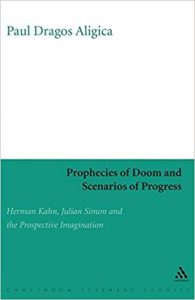 Prophecies of Doom and Scenarios of Progress. Herman Kahn, Julian Simon and the Prospective Imagination. Continuum / Bloomsbury Publishing, London and New York.
Prophecies of Doom and Scenarios of Progress. Herman Kahn, Julian Simon and the Prospective Imagination. Continuum / Bloomsbury Publishing, London and New York.
This book reconstructs and describes the basic elements of the pro-growth alternative paradigm that emerged in the seventies as a response to the Club of Rome and the “limits to growth” movement. Using the work of the two major founders of this alternative approach, Herman Kahn and Julian Simon, he outlines a comprehensive perspective on its methodological and conceptual foundations. Herman Kahn was the first scholar and public intellectual to engage and refute the “doomsday” theses advanced by the Club of Rome and its followers. In his spirited and optimistic arguments, he made a strong case for the feasibility, desirability and morality of global economic growth, arguing that even given all the likely human, environmental, and material costs and risks, “the case is close to if not fully overwhelming.” Julian Simon elaborated the “anti-doomsayers” lines opened by Kahn, articulating new and precise arguments on issues such as population growth, natural resources scarcity and technological change, while reinforcing Kahn’s thesis that continued world economic development is a moral imperative as well as a practical desideratum. Together, Kahn and Simon managed to build the foundations of the counter-reaction to the “limits to growth” rhetoric. Both were not only public figures of great accomplishments and influence but also remarkable thinkers and personalities.
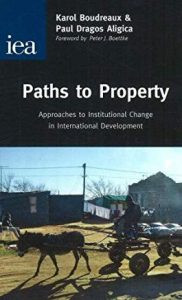 Paths to Property: Approaches to Institutional Change in International Development, with Karol Boudreaux, IEA Publications, Institute for Economic Affairs London.
Paths to Property: Approaches to Institutional Change in International Development, with Karol Boudreaux, IEA Publications, Institute for Economic Affairs London.
Billions of dollars where channeled into foreign aid over the last fifty years, yet in many recipient countries absolute poverty has increased and life expectancy has declined. Karol Boudreaux and Paul Aligica argue that instead of traditional approaches to development policy, the focus needs to be on adoption of sound political and legal institutions, with clearly defined and enforced private property rights to encourage entrepreneurship and economic growth. The authors examine several case studies of property rights reform in the developing world and suggest that universal policies applied regardless of local culture and tradition tend to fail. Reforms are more likely to succeed when they evolve gradually and are tailored to local norms and values rather than imposed from above by governments, aid agencies and supranational institutions.
Edited Volumes:
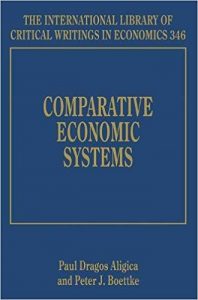 Comparative Economic Systems (edited by Aligica, P. and Boettke, P.), Edward Elgar International Library of Critical Writings in Economics Series, Edward Elgar Publishing, Cheltenham.
Comparative Economic Systems (edited by Aligica, P. and Boettke, P.), Edward Elgar International Library of Critical Writings in Economics Series, Edward Elgar Publishing, Cheltenham.
The search for alternatives to capitalism and the problem of comparative assessment of the performance of socialist and capitalist systems have inspired one of the richest and most remarkable episodes in the history of economic thought. By the mid 20th century an entire field had emerged, conceptualizing, theorizing, monitoring, and analyzing the largest and most consequential social and economic natural experiment in human history: Real-life Socialism. This volume focuses on the fundamental literature associated with the comparative study of socialist and capitalist systems. It features both a well-rounded inquiry of the modern history of economic thought, as well as a vibrant and critical disentanglement of the role of the economic system from the role of environment and policy decisions, as determinants of economic performance. Together with an original introduction by the editors, this collection will be an interesting and invaluable research resource for libraries, academics and students alike. Contributors include: A. Bergson, G. Grossman, L. Hurwicz, J. Kornai, S. Kuznets, J.M. Montias, W.G. Nutter, M. Olson, F. Pryor, J. Stiglitz.
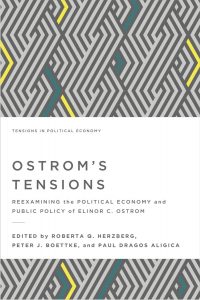 Ostrom’s Tensions: Reexamining the Political Economy and Public Policy of Elinor C. Ostrom, eds. Roberta Q. Herzberg, Paul Dragos Aligica, and Peter J. Boettke. Arlington, VA: Mercatus Center at George Mason University.
Ostrom’s Tensions: Reexamining the Political Economy and Public Policy of Elinor C. Ostrom, eds. Roberta Q. Herzberg, Paul Dragos Aligica, and Peter J. Boettke. Arlington, VA: Mercatus Center at George Mason University.
Elinor Ostrom’s work challenged the belief that a system of governance based on expert public officials could perform better and should a priori be preferred to a system based on citizens’ self-governance. Like any great and productive scholar, her body of work includes tensions, flaws, and inconsistencies that must be confronted by scholars looking to engage, critique, and advance her distinctive project in political economy. Starting from the recognition that Ostrom’s work remains open for contestation and improvement, Ostrom’s Tensions: Reexamining the Political Economy and Public Policy of Elinor C. Ostrom presents a critical assessment of Ostrom’s research and ideas. The contributions to this edited volume, which include original chapters by several of Ostrom’s colleagues and students, identify sources of tension within her writing. The research program Ostrom developed continues as an open-ended project advancing adaptable models and polycentric governance solutions rather than static models and one-size-fits-all policies. Taken as a whole, this volume identifies important questions and areas for future research by the next generation of political economists.
Economic Dualism and Agrarian Policies – Dabu, Adina, Dragos Aligica, Paul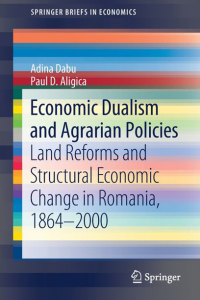 This book offers an in-depth case study of Romania’s land and agricultural reforms from mid-19th century and up to 2000, offering a historical account of agricultural reforms in post-communist Romania in the light of more than a century of social and economic development experiments. Taking a ‘dual economy’ analytic perspective, the book examines the impact of structural and agricultural reforms on the country’s economic development and provides an analysis of the ideas and models that stood behind policy reforms aiming at the modernization of an economy and society defined by dualism and late development.
This book offers an in-depth case study of Romania’s land and agricultural reforms from mid-19th century and up to 2000, offering a historical account of agricultural reforms in post-communist Romania in the light of more than a century of social and economic development experiments. Taking a ‘dual economy’ analytic perspective, the book examines the impact of structural and agricultural reforms on the country’s economic development and provides an analysis of the ideas and models that stood behind policy reforms aiming at the modernization of an economy and society defined by dualism and late development.
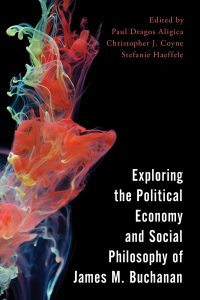 Exploring the Political Economy and Social Philosophy of James Buchanan, (edited by Aligica, P. and Coyne, C. and Haeffle. S.), Rowman and Littlefield, London New York.
Exploring the Political Economy and Social Philosophy of James Buchanan, (edited by Aligica, P. and Coyne, C. and Haeffle. S.), Rowman and Littlefield, London New York.
James M. Buchanan, winner of the Nobel Prize in Economics in 1986, was a pioneer of public choice and constitutional political economy, as well as contributing to many fields of study, including philosophy, political science, and public finance. Each chapter in this volume seeks to explore, critique, and emphasize the continuing relevance of the vast contributions of Buchanan to our understanding of political economy and social philosophy. The diversity in topics and approaches will make the volume of interest to readers in a variety of fields, and accessible to scholars from a variety of backgrounds providing the opportunity to further a cross-disciplinary exploration and discussion on market process theory.
 Rules, Choices and Collective Action. Vincent and Elinor Ostrom on the Study of Institutions and Governance, (edited by Aligica, P. and Sabetti, P.) The European Consortium for Political Research (ECPR) Press.
Rules, Choices and Collective Action. Vincent and Elinor Ostrom on the Study of Institutions and Governance, (edited by Aligica, P. and Sabetti, P.) The European Consortium for Political Research (ECPR) Press.
This volume brings a set of key works by Elinor Ostrom, co-recipient of the Nobel Prize in Economic Sciences, together with those of Vincent Ostrom, one of the originators of Public Choice political economy. The two scholars introduce and expound their approaches and analytical perspectives on the study of institutions and governance. The book puts together works representing the main analytical and conceptual vehicles articulated by the Ostroms to create the Bloomington School of public choice and institutional theory. Their endeavors sought to ‘re-establish the priority of theory over data collection and analysis’, and to better integrate theory and practice. These efforts are illustrated via selected texts, organised around three themes: the political economy and public choice roots of their work in creating a distinct branch of political economy; the evolutionary nature of their work that led them to go beyond mainstream public choice, thereby enriching the public choice tradition itself; and, finally, the foundational and epistemological dimensions and implications of their work
 In Defense of Thinking. The Essential Herman Kahn, edited with an introduction by Paul Dragos Aligica and Kenneth R. Weinstein, Lexington Books – Rowman & Littlefield Publishers.
In Defense of Thinking. The Essential Herman Kahn, edited with an introduction by Paul Dragos Aligica and Kenneth R. Weinstein, Lexington Books – Rowman & Littlefield Publishers.
By the time of his untimely death in 1983, Herman Kahn was recognized by both friends and intellectual adversaries as “one of the world’s most creative and best minds. The decades that have passed since his death allow us to approach his intellectual legacy undisturbed by the “sound and fury” of the many public debates and controversies he participated in and to focus on some of the deepest and most enduring dimensions of his contributions. The measure of his impact is given by the fact that an important part of the ideas he promoted have become meanwhile part of the public discourse in such a profound manner that now we tend to take them from granted. The Essential Herman Kahn offers the public for the first time an anthology consisting of the best of Herman Kahn’s work. It brings together, out of the several thousands of pages published in his life, the ‘essential Kahn’ the most relevant, consequential, and interesting themes, ideas, and arguments of his work in areas such as international relations, public policy, environmentalism, strategic thinking, and futurology.
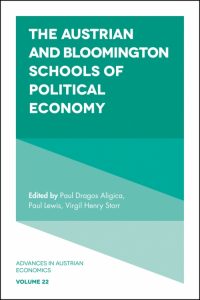 The Austrian and the Bloomington Schools of Political Economy (edited by Aligica, P. D. and Lewis, P. A. and Storr, V. H.), Advances in Austrian Economics Series, Emerald Publishers.
The Austrian and the Bloomington Schools of Political Economy (edited by Aligica, P. D. and Lewis, P. A. and Storr, V. H.), Advances in Austrian Economics Series, Emerald Publishers.
The relationship between the Austrian tradition and Bloomington institutionalism has been part of a larger intellectual evolution of a family of schools of thought that coevolved in multiple streams over the last 100 years or so. The Bloomington scholars, once they delineated the broader parameters of their own research program, started to reconstruct, reinterpret, and in many cases simply rediscover and reinvent Austrian insights and themes. As such, they created the possibility of giving those insights and themes new interpretations and new applications, in novel circumstances with new research priorities, in particular, public administration, governance and collective action, and entrepreneurship in non-market settings. Was there a programmatic and explicit effort to recover and reinvent the Austrian tradition? The answer has to be an emphatic ‘no’. But that is precisely the reason why the Ostroms’ work should be interesting to scholars working in the Austrian tradition. The thematic convergence and the compatibility and complementarity between the Austrian and Bloomington schools is driven by their internal underlying theoretical logic and by the logic of problem solving. The convergence and interplay between these two intellectual traditions is rich and productive. On the one hand, it stands as a demonstration of the applied relevance of the set of approaches and issues that we traditionally associate with the Austrian tradition. On the other hand, it is a challenge to further explore and elaborate this area. This volume is an attempt to respond to that challenge.
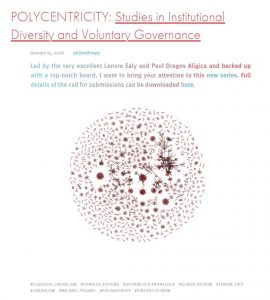 SERIES EDITOR (WITH L. EALY) OF “POLYCENTRICITY: STUDIES IN INSTITUTIONAL DIVERSITY AND VOLUNTARY GOVERNANCE”, ROWMAN AND LITTLEFIELD.
SERIES EDITOR (WITH L. EALY) OF “POLYCENTRICITY: STUDIES IN INSTITUTIONAL DIVERSITY AND VOLUNTARY GOVERNANCE”, ROWMAN AND LITTLEFIELD.This interdisciplinary series explores the varieties of social institutions, processes, and patterns of governance that emerge through individuals’ coordination, cooperation, and competition in governance systems based on freedom of choice, freedom of exchange, and freedom of association. Under conditions of relative freedom of association, human diversity leads to institutional diversity and polycentric structures. In contrast to monocentric, unitary, and hierarchical command and control systems, polycentric social systems comprise many decision centers interacting freely under an overarching set of common rules. The notion of polycentricity has proven itself able to offer a powerful analytical framework for expanding our understanding of the operation of governance regimes, constitutional federalism, law, public administration, private ordering, civics and citizenship, subsidiarity, nonprofit organization, cultural pluralism, civil society and entrepreneurship.Studies in this series refine the conceptual framework of polycentricity and its governance theory implications, while expanding their application in the study of what Alexis de Tocqueville called the art and science of association. These studies should be of interest to scholars, policymakers, executives, social entrepreneurs, and citizens working to devise ways of living together harmoniously in civil societies.